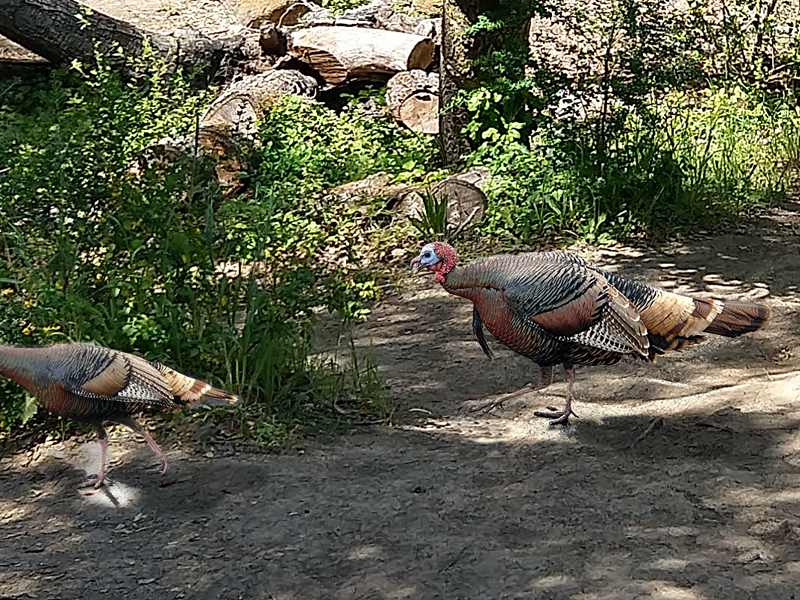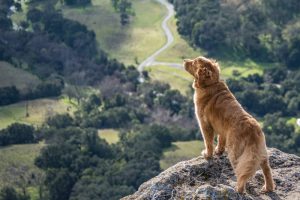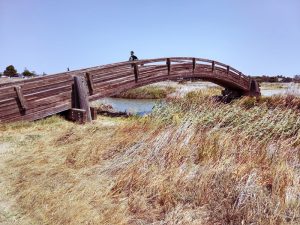Wild turkeys, canine capers and marshland explorations this month in East Bay Parks

 SAN FRANCISCO EAST BAY AREA, CA (Nov. 12, 2022) — It’s time again for my annual primer on turkeys, those birds that appear in parks, open spaces, suburban streets, and on dinner tables the fourth Thursday in November.
SAN FRANCISCO EAST BAY AREA, CA (Nov. 12, 2022) — It’s time again for my annual primer on turkeys, those birds that appear in parks, open spaces, suburban streets, and on dinner tables the fourth Thursday in November.
Turkeys are native to eastern and central North America. A variety existed in what is now California about 10,000 years ago, but the species died out. The turkeys we see in the wild these days are descendants of birds that were introduced to the state many years ago for hunting purposes, with the approval of the California Department of Fish and Wildlife.
There is a turkey-hunting season in California, but no hunting of any kind is allowed in the East Bay Regional Parks. For turkey-hunting regulations, visit wildlife.ca.gov.
Wild turkeys live in oak woodlands. They are ground nesters, but can fly up into trees to escape predators. Their diet consists of seeds, bugs, berries, acorns in the fall and clover in the spring. Their predators include mountain lions, bobcats, coyotes and golden eagles.
Strong and fast
Adult wild turkeys weigh 15 to 20 pounds. They have strong chest muscles, enabling rapid flight, and can run as fast as 18 miles per hour. The position of their eyes gives them a visual range of 270 degrees. Their hearing is acute, too.
Wild tom turkeys assemble a harem of 14 to 20 hens between mid and late February. Breeding is in March, eggs are laid in April, and the poults (baby birds) hatch in May.
Female turkeys nest amid rocks and brush. The freshly hatched poults can’t fly for their first two weeks of life, so they are most vulnerable to predators during that period. If you see turkeys in the parks, please do not approach them or try to feed them. Just enjoy watching them from a distance.
Canine Capers and Rabbit Habits

The next session of “Canine Capers,” a monthly hike on park trails for folks and their furry friends, will be from 9 to 11 a.m. on Saturday, Nov. 19 at Sunol Regional Wilderness with naturalist Kristina Parkison.
Meet at the visitor center. People without dogs are welcome, too, as long as they are comfortable with off-leash dogs around them. All children must be accompanied by an adult.
Sunol Regional Wilderness is located at the end of Geary Road off Calaveras Road about five miles south of I-680 and the town of Sunol. The hike is free; there’s a parking fee of $6 per vehicle. For information, call 510-544-3249.
Learn all about rabbits and their habits – why they are great hoppers and how they use those long ears — during a naturalist-led program from 10:30 to 11 a.m. on Saturday, Nov. 19 at Ardenwood Historic Farm in Fremont.
Ardenwood is located at 34600 Ardenwood Boulevard, just north of Highway 84. The program is free and disabled accessible. No registration is required. Ardenwood admission fee applies. For information, call 510-544-2797.
Martinez and Oakley Shorline explorations

Plants and animals of a tidal marshland habitat will be the stars of a program from 9 to 11 a.m. on Sunday, Nov. 20 at Radke Martinez Regional Shoreline in Martinez, led by naturalist Kevin Dixon.
It’s a three-mile flat walk to view the wildlife, including time at a pocket beach as the tide rolls back through Carquinez Strait to the Pacific Ocean.
Meet Kevin in the parking lot on the left off N. Court Street just past Joe DiMaggio Drive. You do not need to register. For information call 510-544-2751.
Take part in a free, nature-themed craft activity from noon to 2 p.m. every Saturday and Sunday in the visitor center at Big Break Regional Shoreline in Oakley.
This drop-in program welcomes families. It requires parent participation however.
Find Big Break at 69 Big Break Road off Main Street in Oakley. For information, call 510-544-3050.
These are just a few of the Park District’s programs. For a full program list, visit www.ebparks.org/things-to-do.
Ned MacKay writes a regular column about East Bay Regional Park District sites and activities. Email him at nedmackay@comcast.net.
